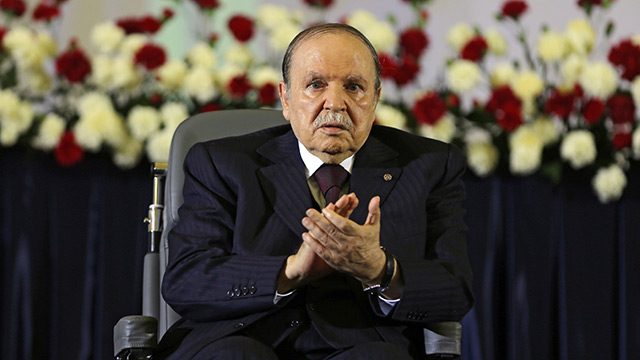SUMMARY
This is AI generated summarization, which may have errors. For context, always refer to the full article.

ALGIERS, Algeria – Abdelaziz Bouteflika was sworn in as Algeria’s president for a fourth term on Monday, April 28, a year after suffering a mini-stroke that was expected to end his 15-year grip on power.
Sitting in a wheelchair and dressed in a navy three-piece suit and crimson tie, Bouteflika placed his right hand on the Koran as he repeated in a frail voice the oath read out by Supreme Court chief Slimane Boudi.
The 77-year-old, who was also in a wheelchair when he cast his ballot in the April 17 election, has hardly been seen in public since the mini-stroke that confined him to hospital in Paris for three months last year.

Official results showed he won 81.5% of the votes in the election marred by low turnout and claims of fraud by his opponents, including main rival Ali Benflis, who received just 12.2%.
In a brief inauguration speech before senior Algerian officials, diplomats and other delegates, Bouteflika stumbled on his words as he thanked the security forces and observers for “ensuring the election was run smoothly”.
Bouteflika also paid tribute to voters and other candidates in the election, which he hailed as a “day of celebration and democracy for Algeria”.
At the start of the ceremony, Bouteflika had sat with his hands on his knees as he inspected soldiers following a display of their weapons outside the beachfront Palace of Nations resort.
After shaking hands with the head of a constitutional panel, Mourad Medelci, and members of his government, Bouteflika was greeted by celebratory ululation.
The inauguration ceremony wrapped up after 30 minutes with a standing ovation for Bouteflika, and a rousing rendition of Algeria’s national anthem.
Bouteflika followed it up by paying tribute to those killed in the war of independence at El Alia cemetery, the final resting place of other former presidents.
Opposition boycott
The opposition boycotted Monday’s swearing-in ceremony, including five parties that had called on their supporters to stay away from the election.
Among the absentees was Benflis, who has refused to recognise Bouteflika’s re-election, saying that doing so would make him “complicit in fraud”. (READ: Algeria ‘silencing critics’ in run-up to polls: Amnesty Int’l)
One of the few remaining veterans of the war of independence against France, Bouteflika first came to power in 1999, and has been dogged by ill health and corruption scandals.
Bouteflika remains popular with many Algerians who credit him with helping to end a devastating civil war and contain Arab Spring protests.
But many people had been clamoring for change.
Algeria has witnessed more self-immolations than Tunisia since 2011 and many people express astonishment that a state with foreign exchange reserves of $182 billion does not do more to improve their lives.
Social discontent and deadly riots rattled Algeria in January 2011 when revolts were spreading across the region, but the regime snuffed out the protests with a sprinkling of political reforms and pay rises.
Bouteflika’s third term in office was overshadowed by speculation about his health, and even rumours he had died, after he underwent surgery in Paris in 2005 for a stomach ulcer.
The Algerian president was hospitalised in France again in April last year after a mini-stroke, spending three months recovering and chairing just two cabinet meetings in 2013.
But he won re-election in a landslide, despite not even taking part in campaigning.
And in his inauguration speech he said he would continue to seek from “international partners” backing for Algeria’s “development based on mutual support and the transfer of technology”.
He also promised the advent of a “diversified economy” in a country heavily reliant on hydrocarbons, which account for 97 percent of exports. – Rappler.com
Add a comment
How does this make you feel?
There are no comments yet. Add your comment to start the conversation.